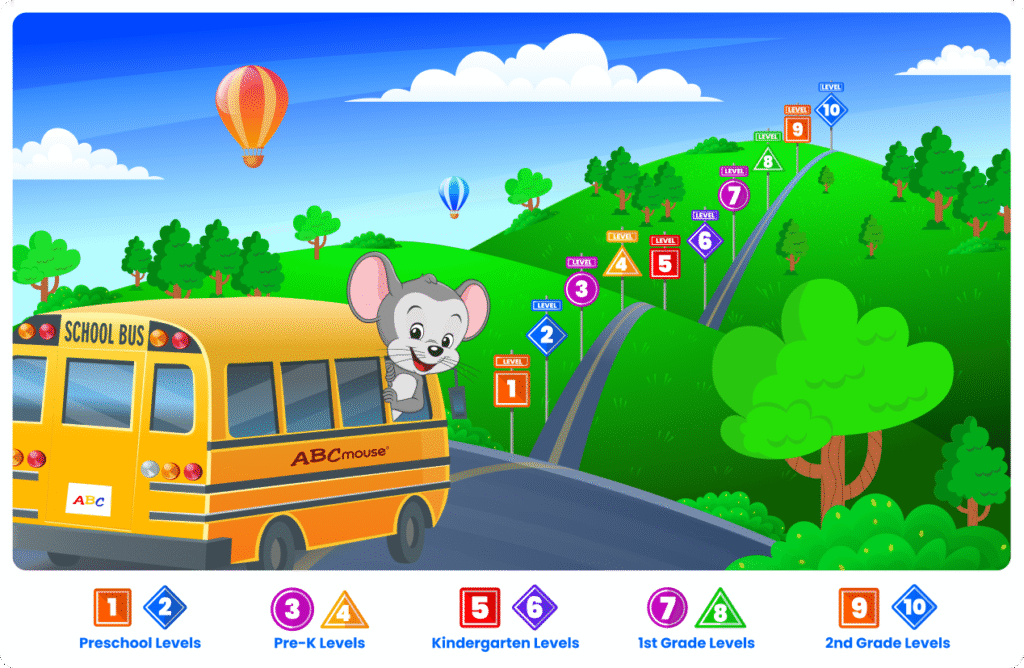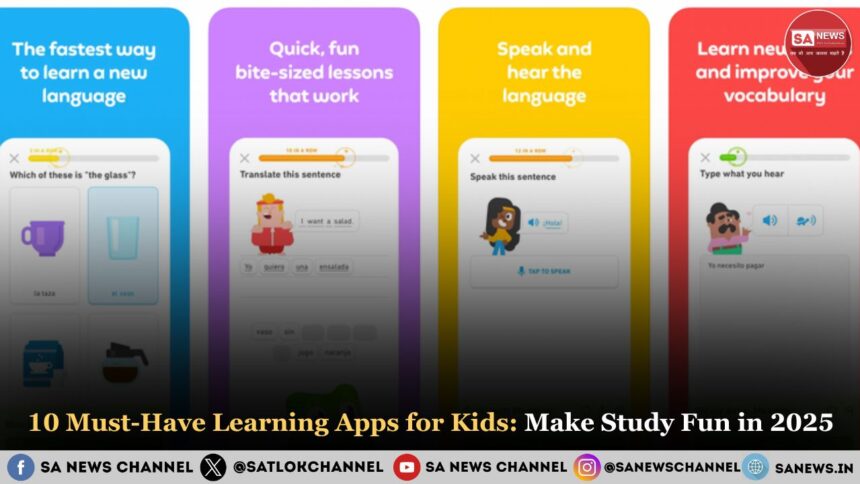Best Learning Apps for Kids: learning is way more than books and blackboards. With kids already glued to their devices, why not turn that screen time into something productive? This list of top 10 learning apps is perfect for parents who want their kids to learn math, science, language, and more — all while having a great time.
- Highlights on 10 Must-Have Learning Apps for Kids
- What’s Driving the Popularity of Learning Apps?
- Why Learning Needs to Be Fun in 2025
- Benefits of Using Learning Apps
- Here Are the 10 Best Learning Apps for Kids in 2025
- 1. Khan Academy Kids
- 2. ABCmouse
- 3. Duolingo ABC (Ages 3–8)
- 4. Quick Maths
- 5. Toca Boca World
- 6. BYJU’S Learning App
- 7. Epic: Kids’ Books and Reading
- 8. BrainPOP Jr.
- 9. Minecraft Education Edition
- 10. ScratchJr
- The Role of AI in Children’s Learning
- Best Learning Apps for Kids: Trends Shaping the Future of EdTech in 2025
- Choosing the Right App for Your Child
- How Can Parents and Teachers Help?
- Are These Apps Safe for Kids?
- Where’s EdTech Going from Here?
- Modern Learning, Ancient Truths: Teaching Kids More Than Just Academics
- FAQs on 10 Must-Have Learning Apps for Kids: Make Study Fun in 2025
- Q1: Are learning apps better than tuition or coaching?
- Q2: Which is the best free learning app for young kids?
- Q3: Can these apps work offline?
- Q4: How can I monitor what my child is learning?
- Q5: Are there any spiritual learning apps for kids?
- Connect With Us on the Following Social Media Platforms
Highlights on 10 Must-Have Learning Apps for Kids
- Learning through fun games and videos
- Age-friendly apps for toddlers to teens
- Covers reading, math, science, coding, and creativity
- Safe and trusted by parents & educators
- Future-ready with AI, AR, and gamification features
What’s Driving the Popularity of Learning Apps?
Best Learning Apps for Kids: The use of educational technology saw rapid growth during the pandemic and has since become a permanent fixture in many households and classrooms. The shift is being fueled by increasing smartphone penetration, greater access to high-speed internet, and growing parental awareness of screen-time quality.
“Kids today are digital natives. Learning through interactive apps resonates with them more naturally than static worksheets,” said Emily Harper, a curriculum designer and early education consultant.
Educational apps for kids now go beyond rote learning, incorporating gamified elements, AI personalization, and cross-curricular content. This makes learning more enjoyable and effective, particularly for early learners and primary school students.
Why Learning Needs to Be Fun in 2025
Let’s be honest — handing kids a textbook just doesn’t cut it anymore. Today’s kids need something that grabs their attention. That’s where educational apps step in. They’re colorful, interactive, and way more engaging than a worksheet. If learning feels like a game, kids will stick with it longer — and even enjoy it!
Also Read: How to Succeed in Online Classes: Top 10 Student’s Guide to Mastering Virtual Learning
Benefits of Using Learning Apps
1. Learning Tailored to Your Child
Most apps today adjust lessons to your child’s speed and level. Struggling with spelling? The app will slow things down. Zooming through math? It’ll step things up!
2. Fun, Interactive Content
Let’s face it — kids love tapping, swiping, and dragging. So why not let them use those fingers to build vocabulary or solve math problems?
3. Motivation Through Play
Gamified learning is a game changer (pun intended). Kids get rewards, unlock levels, and feel like they’re winning while learning. Who wouldn’t love that?
Here Are the 10 Best Learning Apps for Kids in 2025
1. Khan Academy Kids

Age Group: 2–8
Key Features: No ads, expert-designed lessons, books and videos
Cost: Free
If you want something solid, free, and trusted — this one’s a no-brainer. It covers reading, math, social-emotional learning, and more. The animations and characters are adorable, and it feels like the app actually talks to your child.
2. ABCmouse

Age Group: 2–8
Key Features: Comprehensive curriculum, progress tracking, interactive games
Cost: Free trial available; $12.99/month thereafter
It’s a full learning system packed into a fun digital world. With over 10,000 activities, this app helps build early literacy, math, and even art skills. It’s not free, but it’s worth every penny if you want structure and fun.
3. Duolingo ABC (Ages 3–8)

Age Group: 5+
Key Features: Language learning, gamified lessons, multilingual interface
Cost: Free with optional premium upgrades
This is perfect for preschoolers just starting to read. It teaches phonics and basic reading through quick, bite-sized lessons. Bonus: it’s totally free and super cute.
4. Quick Maths
Age Group: 6–12
Key Features: Mental math focus, adaptive challenges
Cost: One-time purchase
Quick Maths helps children sharpen arithmetic skills through short, timed challenges. Its intuitive design allows students to solve problems by drawing answers on-screen, encouraging mental calculation.
5. Toca Boca World
Age Group: 4–12
Key Features: Creative play, real-life simulations, open-ended storytelling
Cost: Free base app with in-app purchases
It’s not your typical study app, but it teaches creativity, roleplay, and real-life scenarios. Kids build cities, cook food, take care of pets — and learn through play.
6. BYJU’S Learning App
Age Group: 5+
Key Features: Conceptual learning, video lectures, quizzes, personalized feedback
Cost: Freemium model with subscription packages
Best Learning Apps for Kids: BYJU’S mixes animations, quizzes, and personal feedback to create a powerful learning journey. Especially great for school subjects like math and science.
7. Epic: Kids’ Books and Reading
Age Group: 4–12
Key Features: Digital library of 40,000+ books, quizzes, audio books
Cost: Free for educators; subscription for home users
Got a little bookworm (or one in the making)? Epic has 40,000+ eBooks, audiobooks, and videos that spark imagination and build vocabulary — all in a safe reading environment.
8. BrainPOP Jr.
Age Group: 5–9
Key Features: Educational cartoons, interactive quizzes, teacher resources
Cost: Subscription-based; free trial available
This app teaches serious topics (like science or history) in fun, cartoon-style videos that kids actually want to watch. Great for curious minds who ask a million “why” questions.
9. Minecraft Education Edition
Age Group: 8+
Key Features: STEM education, collaborative learning, coding modules
Cost: Requires education license or subscription
Best Learning Apps for Kids: It’s not just about building castles — this version of Minecraft lets kids learn chemistry, coding, math, and teamwork through creative challenges.
10. ScratchJr
Age Group: 5–7
Key Features: Introductory coding, animation creation, logical thinking
Cost: Free
A great way to introduce kids to coding without needing any prior experience. They’ll drag and drop blocks to create animations and stories — all while learning problem-solving.
The Role of AI in Children’s Learning
Artificial intelligence is shaping the next generation of educational apps by offering adaptive learning paths, real-time feedback, and even personalized tutoring. AI-driven platforms can adjust difficulty levels based on performance and suggest tailored content for individual learners.
Reddit cofounder Alexis Ohanian recently shared how he uses AI with his daughter. “Every night she draws a picture, and we use AI tools like ChatGPT to write a story around it. It’s her favorite bedtime ritual now,” Ohanian told Business Insider.
AI Caution and Concerns
Despite the benefits, some education experts urge caution. “AI tools should supplement, not replace, foundational learning experiences such as hands-on play, social interaction, and reading physical books,” said Dr. Hannah Choi, a pediatric neuropsychologist.
According to a Vox report, parents are encouraged to be active participants in their children’s AI-based learning to ensure technology is used responsibly and ethically.
Best Learning Apps for Kids: Trends Shaping the Future of EdTech in 2025
1. Gamification
Apps that reward children with stars, coins, or badges for completing tasks continue to perform well. This reward system builds motivation and encourages continued engagement.
2. STEAM Learning
Apps like Tynker and CodeSpark Academy are emerging as popular choices for coding and problem-solving, emphasizing Science, Technology, Engineering, Art, and Math (STEAM) skills.
3. Accessibility Features
Modern apps are increasingly incorporating text-to-speech, adjustable font sizes, and translation options to accommodate diverse learners, including those with special needs.
4. Cross-Platform Availability
Parents are looking for apps that work across phones, tablets, and desktops, and many developers are responding with cloud-syncing capabilities and parental dashboards.
Choosing the Right App for Your Child
1.Think About Their Age
Some apps are made for toddlers; others for pre-teens. Always check age recommendations and test it out yourself if needed.
2. Match Their Interests
If your kid loves animals, get a science app with wildlife. If they love stories, go for reading-focused platforms.
3. Don’t Overdo Screen Time
Even if the app is educational, kids still need balance. Let them explore, then encourage some off-screen time.
How Can Parents and Teachers Help?
No app replaces a real teacher or parent. The magic happens when you get involved. Ask questions, watch lessons with them, or connect the app’s topics to everyday life.
Are These Apps Safe for Kids?
Absolutely. The apps listed here are designed with child safety in mind — no shady ads, no weird popups. Most are COPPA compliant and include parental control features.
Where’s EdTech Going from Here?
Best Learning Apps for Kids: In 2025, education is merging with tech like never before. We’re seeing AI tutors, VR classrooms, and personalized learning at scale. The future is hands-on, immersive, and exciting for the next generation of learners.
Modern Learning, Ancient Truths: Teaching Kids More Than Just Academics
In 2025, educational apps are revolutionizing the way children learn. From animated science lessons to gamified coding platforms, technology offers immense benefits. Yet, as emphasized in the teachings of Sant Rampal Ji Maharaj — based on deep scriptural evidence — all worldly knowledge is ultimately incomplete if it does not lead a soul toward realization of the Supreme God and attainment of salvation (moksha).
Saint Rampal Ji Maharaj explains how even great sages and scholars of the past lacked true spiritual knowledge due to ignorance of the scriptures. Despite being intellectuals or spiritual leaders, they failed to recognize the Supreme Power, and thus could not guide people towards true liberation. Sant Rampal Ji Maharaj highlights that modern education, if not directed towards identifying the real aim of life — to know God and attain salvation — becomes a source of arrogance, immorality, and spiritual downfall.
Today’s education, instead of fostering character and self-realization, often promotes material greed, ego, and competition. Sant Rampal Ji Maharaj says, “If we acquire education but do not seek God, that education is worthless”
It’s essential to give our kids the best tools for material success but real knowledge is spirituality. Saint Rampalji Maharaj emphasizes that without knowing the truth of life — who we are, why we’re here, and where we go after death — all other knowledge remains incomplete.
Therefore, while apps like BYJU’S, Duolingo ABC, or ScratchJr offer great tools for intellectual development, true fulfillment comes when children also learn about devotion, moral values, and the eternal truths described in scriptures like the Vedas, Quran, Bible, and Guru Granth Sahib — all decoded with clarity by Sant Rampal Ji Maharaj Ji.
Along with smart learning, let’s introduce our children to true wisdom through spiritual discourses and books like Gyan Ganga. Only by combining modern education with divine wisdom can children grow into not just smart individuals but also virtuous souls destined for liberation.
FAQs on 10 Must-Have Learning Apps for Kids: Make Study Fun in 2025
Q1: Are learning apps better than tuition or coaching?
Not exactly better — but they’re a great add-on. Apps can make concepts clearer, but guidance from teachers and parents still matters.
Q2: Which is the best free learning app for young kids?
Khan Academy Kids and Duolingo ABC are completely free and great for early learners.
Q3: Can these apps work offline?
Some apps offer offline modes (like Epic and ABCmouse), but features may be limited. Always check app settings.
Q4: How can I monitor what my child is learning?
Most apps come with parent dashboards. You can track progress, time spent, and topics covered.
Q5: Are there any spiritual learning apps for kids?
Yes, spiritual apps and platforms like the official app of Saint Rampalji Maharaj offer moral stories, spiritual knowledge, and peaceful content for kids.









